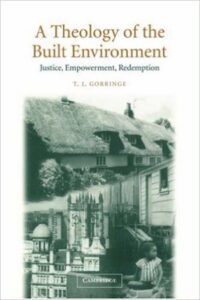 Justice, Empowerment, Redemption
Justice, Empowerment, Redemption
While many theological reflections exist on the city, none have recognized the built environment as a whole. In A Theology of the Built Environment, Gorringe examines this valuable dimension. He considers the divine grounding of constructed space, the ownership of land, the issues of housing (both urban and rural), and the built environment in terms of community and art. Drawing on a huge range of theological and social scientific reading, Gorringe places pressing issues surrounding the environment into a larger framework to guide the Church forward.
In an excerpt provided by Cambridge University Press, Gorringe writes:
To be human is to be placed: to be born in this house, hospital, stable (according to Luke), or even, as in the floods in Mozambique in 2000, in a tree. It is to live in this council house, semi-detached, tower block, farmhouse, mansion. It is to go to school through these streets or lanes, to play in this alley, park, garden; to shop in this market, that mall; to work in this factory, mine, office, farm. These facts are banal, but they form the fabric of our everyday lives, structuring our memories, determining our attitudes. How, as Christians, should we think of them? Are they a proper subject for theological reflection? Here and there great theologians, notably Aquinas and Calvin, have glanced in this direction, but the built environment forms no locus in theological ethics except insofar as it has dealt with land and property, and with the city as a metaphor for community, or our final destination. It is in ethics that theology has engaged with the concrete – with war, economics, work, sexuality. Why not, then, with the built environment?
Find more information on the publication here. To continue reading the excerpt, click here.
Timothy Gorringe is working on a two-year AHRC-funded research project on the values which underpin constructive social change, concentrating on the Transition Town Movement. His academic interests focus on the interrelation between theology, social science, art and politics. His most recent books are The Common Good and the Global Emergency (2011) and Earthly Visions: Theology and the Challenges of Art (2011).
